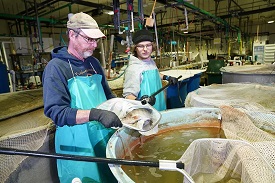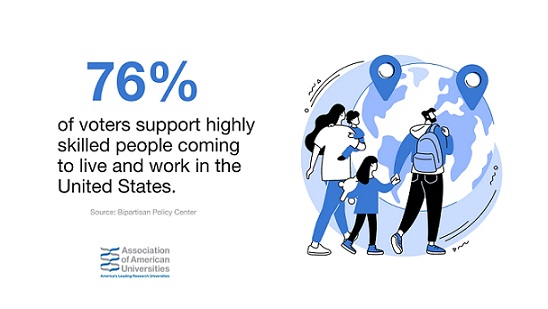 Barbara’s Blog: Correcting Fundamental Misunderstandings of College Endowments
Barbara’s Blog: Correcting Fundamental Misunderstandings of College Endowments
AAU President Barbara R. Snyder recently published a blog post explaining what university endowments are and why taxing them is a bad idea. As President Snyder explained, endowments are composed of “thousands of individual funds,” the proceeds from which are “legally restricted to use for particular purposes set out by the donor.” Universities use endowments “to subsidize tuition or support research and other educational programs,” she wrote.
In fact, a recent report from the National Association of College and University Business Officers showed that, in FY22, colleges used their endowments to primarily fund student financial aid programs, academic programs and research, endowed faculty positions, campus operations, and other educational endeavors.
Despite the fact that endowments help subsidize tuition and support research, policymakers and talking heads continue to drum up support for expanding an existing tax on endowments, enacted for the first time in 2017, which currently only applies to a handful of universities. As President Snyder noted, funds collected from university endowments as a result of the existing tax “go directly into the United States Treasury’s general fund and are not designated to support any particular educational or social program.” Expanding the tax, she argued, would actively undermine AAU members’ efforts to make college more affordable.
Endowments are not piggy banks or rainy-day funds, President Snyder emphasized. “As the work of the 118th Congress enters its full swing and as state legislatures gather, AAU is laboring behind the scenes to fend off any new proposals to expand on these misguided and counterproductive taxes,” she wrote.
 President Biden Releases FY24 Budget Request
President Biden Releases FY24 Budget Request
Last Thursday, President Biden released a summary of his FY24 budget. The president’s budget proposes $6.8 trillion in overall funding and includes crucial increases for many education and research programs. In particular, the proposal increases the annual maximum Pell Grant award and provides $21 billion in discretionary spending for activities authorized by the bipartisan 2022 CHIPS and Science Act, including at the Department of Energy and the National Science Foundation. Additional spending levels, justifications, and supporting materials are expected to be released later today.
AAU is currently evaluating the budget to see how it aligns with our priorities, including for funding crucial scientific research. A White House fact sheet on the president’s budget is available here.
DOE Requests Input on Approaches to Preparing Students for Careers in Quantum Information Science
The Department of Energy Office of Science is requesting input from higher education institutions on how they are preparing students for careers in quantum information science (QIS) and on how “DOE’s network of national laboratories could assist in training the future scientific and technological QIS workforce.” Per the request for information, QIS “has the potential to produce innovations in quantum computing, simulation, communication, sensing and other technologies which are critical to our nation’s future economic and national security.”
DOE will use the feedback “to develop a plan to complement training provided by higher education institutions” to prepare students for careers in QIS. Responses to the RFI are due April 20.
News of Interest
Detroit Free Press: Santa Ono Formally Installed as University of Michigan’s 15th President – Santa Ono was formally inaugurated as the University of Michigan’s 15th president last week. At the ceremony, Ono spoke both about the university’s legacy and his vision for its future. “I’m convinced that the brightest days for the University of Michigan lie ahead,” he said.
Deseret News: Opinion: The U Is Expanding Cultural Perspectives Through Partnership with Historically Black Colleges and Universities – In an opinion piece, Rodney T. Cohen, manager of the HBCU Partnership Program at the University of Utah, explains how the school is working with historically Black colleges and universities like Howard University, Morgan State University, and Morehouse College to enrich students’ academic experiences. The partnership currently focuses on “collaborative research, faculty/student exchanges and access to advanced degrees,” writes Cohen.
USA Today: As Lawsuits Pile Up, Democrats Make Fresh Push for Student Loan Forgiveness – Dozens of House and Senate Democrats sent a letter to President Biden last week expressing support for the administration’s student loan forgiveness program, which is currently tied up in a series of lawsuits. Late last month, the Supreme Court heard arguments in two of the cases and signaled its skepticism regarding the president’s authority to cancel debt. The Democrats’ letter hinted “at upcoming efforts in Congress to chips away at student loan debt” in case the Supreme Court blocks the plan.
Boston Globe: Robert Kraft Forms Partnership with Brandeis University to Combat Antisemitism – Brandeis University and New England Patriots owner Robert Kraft are collaborating on an initiative to address the recent rise in antisemitism across the country. The Robert Kraft Family-Brandeis Collaboration will “find innovative ways to educate and empower Jews and non-Jews,” said Kraft. Brandeis University President Ron Liebowitz said that, given the university’s legacy of being founded by the American Jewish community in response to antisemitism in higher education, “the university has both an obligation and role to play in educating young people about the persistence of antisemitism and its impact on Jews and non-Jews alike.”
Inside Indiana Business: Purdue Among ‘Most Innovative’ Companies – Fast Company magazine has named Purdue University as the 16th most innovative company in the world, even though the school is not a company. The only university on the list, Purdue was “recognized for its efforts to bolster the semiconductor workforce and conduct research of the future.” Purdue University President Mung Chiang said that the university “will keep pushing the frontiers of semiconductors learning, research and industry partnership.”
Science – Lawmakers Offer Contrasting Views on How to Compete with China in Science – In two hearings last week, members of Congress debated competing approaches on how to best win the technology race against China. House Science Committee Chair Frank Lucas (R-OK) and many Democrats argued for increased funding for scientific research as the best way to compete. In contrast, Rep. Mike Gallagher (R-WI), chair of the new House Select Committee on the Strategic Competition Between the United States and the Chinese Communist Party, and many of his Republican colleagues opposed investments in science in favor of “hobbling China through trade and other sanctions designed to hinder its access to U.S.-made technology.”
Featured Research

Common Pregnancy Complications
May Delay Development of
Infant in the Womb
A University of Southern California-led study has found that newborns exposed to common complications during pregnancy, including preeclampsia or gestational diabetes, were biologically younger than their chronologic gestational age. The research raises “intriguing questions” about whether common pregnancy complications can cause developmental delays or “affect infants and health outcomes later in childhood.”

$10 Million USDA Grant Targets
More Midwestern Seafood Production and Consumption
Purdue University has received a $10 million grant from the U.S. Department of Agriculture to help increase seafood production using aquaponics in the Midwest. Aquaponics allows farmers to grow aquatic organisms and plants in water under controlled conditions but can consume a lot of energy and produce harmful wastewater. Purdue researchers plan to use the grant to set up a zero-waste food production aquaponics system that can run independently of the power grid and can be eventually adopted by farmers across the region.
Upcoming Events
 The White House Office of Science and Technology Policy is hosting a series of virtual listening sessions to inform the development of the 2023-2028 Federal STEM Strategic Plan. The five-year plan will lay out the federal government’s vision for STEM education in the United States and guide federal activities and investments to ensure U.S. leadership in STEM innovation. The six listening sessions are as follows:
The White House Office of Science and Technology Policy is hosting a series of virtual listening sessions to inform the development of the 2023-2028 Federal STEM Strategic Plan. The five-year plan will lay out the federal government’s vision for STEM education in the United States and guide federal activities and investments to ensure U.S. leadership in STEM innovation. The six listening sessions are as follows:
Wednesday, March 15, 3:00-5:00 p.m. ET
STEM Education: Support Learners and Educators in and across All Science and Technology Disciplines
Friday, March 17, 2:00-4:00 p.m. ET
STEM Workforce Development: Prepare and Recruit Our Nation’s Future STEM Workforce
Monday, March 20, 3:00-5:00 p.m. ET
STEM Workforce: Foster Inclusive STEM Learning and Working Spaces to Retain STEM Learners and Workers
Wednesday, March 22, 4:00-6:00 p.m. ET
STEM Engagement: Foster Meaningful Community and Public Engagement in Science and Technology
Friday, March 24, 2:00-4:00 p.m. ET
STEM Research and Innovation Capacity: Build and Drive Capacity and Cutting-Edge STEM (and STEM Education) Research and Development
Monday, March 27, 6:00-8:00 p.m. ET
The National STEM Ecosystem
Stat of the Week

Majority of American Voters Support High-Skilled Immigration
A new Morning Consult poll, conducted on behalf of the Bipartisan Policy Center, shows that a majority of American voters support high-skilled immigration. The poll found that “76% of voters strongly support (40%) or somewhat support (36%) highly skilled people coming to live and work in the United States, including 85% of Democrats, 74% of independents, and 68% of Republicans.”